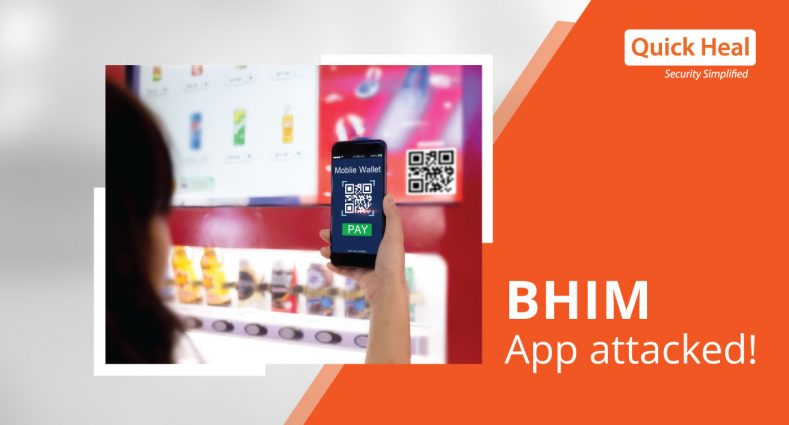BHIM App attacked! Secure your online banking today with Quick Heal

India’s BHIM (Bharat Interface for Money) app used for mobile payments was reported recently to have suffered a massive data leakage of 7.26 million records, according to a security research company. According to the report, the leak happened due to a flaw in a website linked to the BHIM app and created by a company called CSC E-governance Services Ltd., in conjunction with the Government of India. The website stored data of over 7 million users all across India, easily enabling a hacker to mine data.
Highly confidential data leaked
The data contained was highly PII (Personally Identifiable Information) and was in the nature of:
· Aadhaar cards
· Caste certificates
· Proofs of residence
· Educational certificates
· Fund transfer documents
· PAN cards
Apart from the above, personal data like names, dates of birth, ages, genders, home addresses, etc. were also accessible, creating a huge security problem and leaving millions at risk of identity fraud. The report suggested that the breach was secured after they brought it to the attention of the authorities while the National Payments Corporation of India later put out a statement denying the breach.
How to stay secure on the Internet?
This report brings into the attention the danger of data leakage, especially in a country like India where data protection laws are still at a nascent stage. India’s cyber-penetration has seen a significant increase and large portions of the population have switched to digital transactions, attracted by the comfort of making payments from the comfort of their devices. On the other hand, cyber education and awareness of safe digital practices remain low in the country, thus exposing these first-time digital payment users at major risk of being conned or robbed of their money due to these types of data leakages.
The breach also highlights the importance of taking the responsibility of your own banking safety online. As this example illustrates, even government organizations are susceptible to data breaches. For the time being, if you have been a user of BHIM, it is important that you keep an eye on your banking transactions to ensure that there is no fraudulent activity. Change your passwords on all your accounts and be extra vigilant when transacting on the Internet.
You should also consider securing your online banking activity with Quick Heal Internet Security if you haven’t done so already. Quick Heal Internet Security provides the ultimate security for your entire Internet needs. Here are some of its powerful features which help you browse the Internet in peace:
The Quick Heal advantage
Safe Banking – The Safe Banking feature protects confidential user credentials like bank account details, username, password, etc. during banking transactions and online shopping from theft. It launches a safe desktop session with supported browsers while preventing threats such as phishing.
Anti-Keylogger – Keyloggers are malware that records all keystrokes and sends them to threat actors. This feature blocks all keystroke spyware, ensuring your passwords and other confidential details remain safe with you.
Browsing & Phishing Protection – Suspicious and harmful websites are immediately so they are not able to infect your PC with malicious spyware. Phishing attempts whereby fraudsters aim to trick you into revealing confidential information area blocked.
These are just a few of the powerful features that come with Quick Heal Internet Security, enabling you to stay secure while you browse the Internet. Install Quick Heal Internet Security now and experience the difference.
No Comments, Be The First!